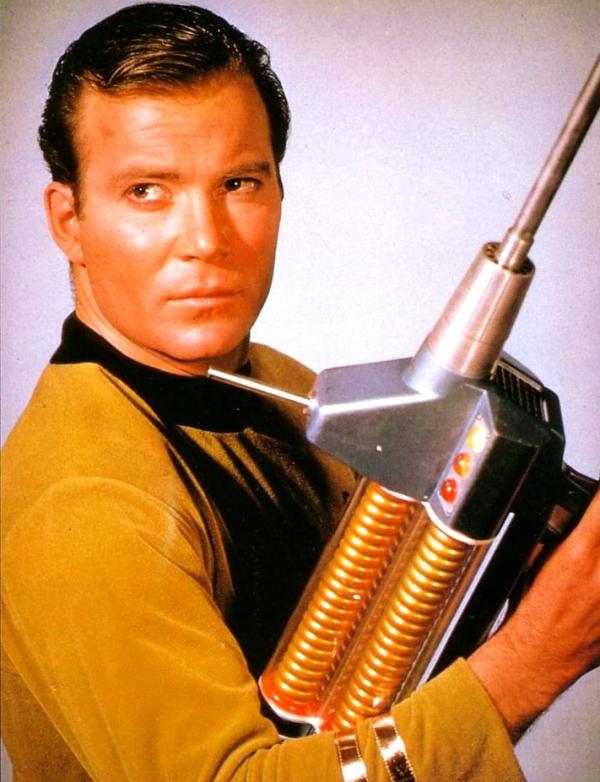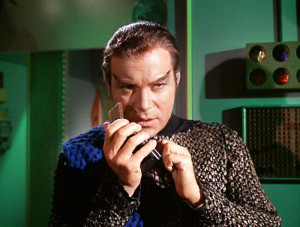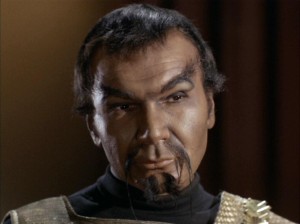Captain James T. Kirk of the United Starship (U.S.S.) Enterprise has long represented heroism, steadfast determination, and honor. In the recent reboot of Star Trek’s original series, Kirk captains the Enterprise and its crew for a whole new audience. I’ve read and come across articles and posts praising the architects of the reboot for making Kirk (and Spock) a hero again. And, I agree that Abrams & Co. did just that. I just don’t know that this is necessarily a good thing, since Kirk’s heroism ultimately upholds oppressive power relations.
Captain Kirk as a Military Hero

Clearly Kirk comes in peace. (tgdaily.com)
A former professor of mine, Gray Cavender, and co-writer Sarah Prior, argue that four main themes arise when “Constructing the Military Hero” in the media. Military heroes typically have a humble yet noble back story, display strength of purpose, uphold gender roles, and uphold nationalistic values. At first glance Kirk may seem to have little or no connection with the military hero. Kirk and others repeatedly tout Starfleet as a fundamentally peacekeeping and exploratory operation, not unlike United Nations peacekeepers. As a captain, Kirk ostensibly fills the role of diplomat and explorer. But, upon closer examination, Kirk’s character construction reflects that of the military hero.
In every iteration of Trek, Kirk grows up in a small town in Iowa, eventually joins Starfleet and wows everyone by becoming the youngest captain in Starfleet history. In the reboot, his father, George Kirk, became a hero for saving most of the crew of a starship while captain for less than 10 minutes. Christopher Pike uses this humble but noble back story to convince an aimless Kirk to join Starfleet.
Kirk quickly proves himself a man who demonstrates – you guessed it – an unshakable strength of purpose. In both the original series and the reboot, Kirk famously reprograms the conditions of the unwinnable Kobayashi Maru test and becomes the only cadet in Starfleet history to have ever beaten the simulation. Both original series Kirk and reboot Kirk have broken treaties without hesitation to “get their guy”, have illegally commandeered ships, and have regularly broken rules, including the biggie – the Prime Directive – in order to achieve their ends.
And, oh yes, Kirk’s character construction certainly reinforces gender norms. Cavender and Prior argue that women play largely victim and/or peripheral roles in militaristic, hero narratives. While both the original series and the reboot feature women in command roles, and even more prominently in the reboot, the women ultimately play secondary roles to the men on the ship and certainly to the primacy of Kirk’s story. Furthermore, Kirk’s virility and normative masculinity are underscored by his several romantic and sexual flings with women all over the universe, his outright manipulation of women, and even his physical violence toward women.
But, what of nationalism? Starfleet works under orders of a new world order, the United Federation of Planets who, evidently, live in peace. We’re also told, repeatedly, that Earth exists in relative peace and all of the old prejudices of Earth’s past have been eliminated. But, cracks appear in this façade upon closer examination. The United States appears to still be a dominant player in the world evidenced by Starfleet academy being headquartered in San Francisco. Further, the English speaking countries in general seem to have largely kept their power as English appears to be the lingua franca of Starfleet and the Federation, despite membership from many planets. We may also observe that despite just vast membership, most ships that we’ve seen remain staffed by mostly white, human officers.
Kirk, who in the original series and the reboot first and foremost sees himself an agent of Starfleet and a captain, upholds and justifies a neo-nationalism that continues to reinforce the power of white men from English speaking countries. Even in the most recent movie, when Kirk questions the actions of one Starfleet admiral, he ultimately returns to Starfleet to end the film with a recitation of his Captain’s oath and to reaffirm his place in Starfleet.
Starfleet as an Imperialistic Military Force
 During the most recent Trek film, we’re meant to recoil at the attempted militarization of Starfleet by a power hungry and war mongering Admiral Marcus. By the end, we’re reassured that Kirk, not Marcus, represents outstanding Starfleet leadership. But, this reification of Kirk as a hero unsettles rather than reassures. Starfleet, as previously mentioned, presents itself as a peacekeeping operation. But, the very language of the mission statement of Starfleet ships, later retconned to be the Captain’s oath, suggests a military operation whose goals call to mind historical imperialism and colonization, the doctrine of discovery and Manifest Destiny, and relentless and tireless expansion of empire. Indeed, creator Gene Roddenberry often touted Trek as a “space western” and a “a wagon train to the stars.”
During the most recent Trek film, we’re meant to recoil at the attempted militarization of Starfleet by a power hungry and war mongering Admiral Marcus. By the end, we’re reassured that Kirk, not Marcus, represents outstanding Starfleet leadership. But, this reification of Kirk as a hero unsettles rather than reassures. Starfleet, as previously mentioned, presents itself as a peacekeeping operation. But, the very language of the mission statement of Starfleet ships, later retconned to be the Captain’s oath, suggests a military operation whose goals call to mind historical imperialism and colonization, the doctrine of discovery and Manifest Destiny, and relentless and tireless expansion of empire. Indeed, creator Gene Roddenberry often touted Trek as a “space western” and a “a wagon train to the stars.”
Space, the final frontier. These are the adventures of the starship Enterprise. Its ongoing mission: to explore strange new worlds, to seek out new life and new civilizations, to boldly go where no one has gone before.

Kirk in Romulan raceface as he tricks his way into Romulan territory (memory-alpha.org)
When stripped down to its core, Trek presents the enlightened Federation and its peacekeeping operation, Starfleet, as seeking to explore space and bring new civilizations into its fold. This is all while protecting Federation planets from the Klingons and Romulans who are violent and dishonest by nature and whose very cultures reproduce these undesirable behaviors. The overt racialization of the enemy empires emphasizes the civilizing nature of white liberalism. Recall that the Federation became free of racial prejudices (though the very makeup of the Enterprise crew contradicts that claim). In this way, Starfleet’s more militaristic interventions and espionage become matters of Federation security and thus legitimized.
Troubling Implications

No, his name, shockingly, is not Fu Manchu. (memory-alpha.org)
I seek to complicate hero worship and understand the ways in which the hero frame can and often does work to perpetuate hegemonic values, actions, and culture. In this instance, Kirk’s heroics mask some very troubling issues and urge us not only to accept the oppressive power relations enforced by military action but to praise them. But, when we praise that the reboot series make Kirk a “hero” again, what are we really praising? Is it imperialism and the triumph of a colonizing force? The doctrine of discovery? and our “Manifest Destiny” as mankind (and I do mean mankind in this instance)? Or are we praising Kirk for being an agent of these forces? Yes, Kirk is a hero. But, I question what these heroes represent and whether I truly want to align myself with them.
Maybe we need new heroes. Maybe we need to ditch the “hero” frame altogether, a frame that glorifies individuals and individuality, and work toward an existence where we work in non-hierarchal collectives to achieve non-oppressive and anti-oppressive goals. To quote Homer Simpson (yes, really): “You stink! You and your whole lousy operations stinks! I quit!”


Great write up. I wanted to add that the individuality angle isn’t the only reason the “hero” frame is dangerous, but also because it promotes a vanity that serves not to *distinguish* mankind from others, but to demonstrate that everything not us is unimportant or hopeless without us. It allows room for a disregard of the world at large and other species entirely (a kind of spece-ism), because it puts humans on a pedestal in a way that ignores the interdependent nature of life. It’s not *close* to vanity, but the definition of vanity. It’s literally a worship of ourselves and our image.
That’s an excellent point. I think that’s one of the ways oppressions are maintained, is by privileging or putting on a pedestal, as you said, those who benefit from that oppression and their norms, values, supposed contributions to the world (in this case the universe). Incidentally, it’s interesting that you say that it’s literally the worship of ourselves and our image, because that image in largely white and male. That’s not to erase the awesome women and/or PoC in the series and the reboot. But, your point really speaks to the allegorical (and actual) racism in the very structure of the show.
Pingback: The Problem with Captain Kirk, or “You and Your Whole Lousy Operation Stinks” | Marena Ni Yukyats